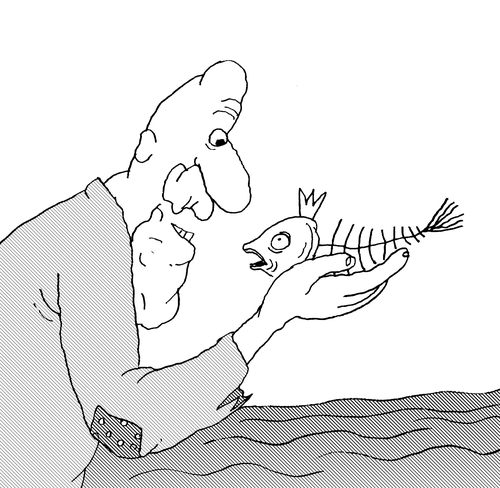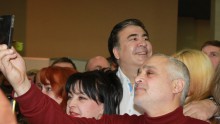In the run-up for the Anticorruption Forum the Kharkiv community debated feverishly trying to figure out if the planned event indeed aimed at seeking ways to counter corruption, or Mikheil Saakashvili’s political force simply tried to use the painful problem in preparing its campaign. Social media revealed divided opinions. However, city dwellers showed an unexpectedly great interest in the event. More than 3,000 turned up at Radmir Expo Hall on January 18. The answers of those asked by The Day about what motivated them to attend the event suggest that the majority would gladly believe in Saakashvili’s miraculous effect on Ukrainian corrupt officials. Happy-end stories of Georgian anticorruption efforts (we doubt that as many as one-third of the public at the “Saakashvili Anticorruption Fora” have ever been to Georgia, or at least took the trouble to talk to the eye-witnesses or participants of the “fabulous” transformations) have made Mikho immune to critic in Ukraine to such an extent that neither Odesa oblast’s hopeless struggle against six foot high snowdrifts (while its governor entertained the Kharkiv public) nor the fact of Saakashvili having his own office in the President’s Administration building (recently revealed at the president’s press conference) made any impression at all.
Kharkiv has a time-honored reputation of the city with the nation’s highest proportion of intellectuals. That is why the unprecedented media hype, created in the run-up to the Forum, suggested a question: is Saakashvili bringing anything special to Kharkiv? Is there a sensation coming? Maybe, he is finally going to produce recorded evidence exposing all those whom he so ruthlessly defamed in Odesa and in Kyiv? Great was our disappointment when also this time around we witnessed a trite hocus-pocus, and not too original at that: speaking from the rostrum, the “brilliant orator” Saakashvili voiced the problems, providently listed by his team who had called the registered Forum participants.
What follows contains no personal opinion, nothing but details, accents, and comments.
Although the opening was announced at 6 p.m., a sizeable crowd gathered at the entrance to the center as early as at 3 p.m. A part of the public would like to participate in the roundtable Global Cafe discussions, a sort of brainstorming before the conference to find out ways to overcome various aspects of corruption in education, health care, business, and public utilities. The discussions lacked proper organization and created the effect of fervent activity with little practical sense. However, the people were satisfied. It turns out that an opportunity to air one’s views is quite enough to make one happy.
“I came to the forum because corruption is the worst problem deterring the state’s development,” says Tamara Zavodnyk, a well-known volunteer and a co-founder of Help Army. “I believe that together we can develop real measures to uproot this problem.” Zavodnyk gained her first experience in such a struggle trying to counter abuse in the supply system of the Ukrainian army, and she is prepared to share her expertise in other spheres.

Sketch by Anatolii KAZANSKY from The Day’s archives, 1998
“This is only a stage in development. I hope very much that people do not expect wonders from this forum, because they are not coming of course,” shrugs Mykhailo Dovhopol, CEO at Automaidan Kharkiv, a civil organization. “In fact, many of us are already involved in the process of fighting corruption. For instance, now we are cooperating with the roadworks department at the city council to create a transparent mechanism for monitoring the allocation of funds and selection of streets and roads to be renovated.”
Economist Taras Danko, Ph.D. and author of the Global City of Kharkiv conception, emphasizes that his contribution to fighting corruption includes extensive enlightenment campaign, which he carries out among his students and colleagues at the Kharkiv Polytechnic. “We have only two ways: either we kick out those flourishing on corruption, or they kick us out. As an economist, I know that corruption hinders economy. And where economy is not working, there is no chance for efficient security or health care. Societies bogged down in corruption have no future, they annihilate.” As a reason for his participation in the forum, Danko cites the importance of involvement in any events concerning nationwide reforms, because they are top priority. He also (and unexpectedly) expressed hope that the forum would help attract investors’ attention: “I wish Kharkiv would show that here the level of society rose to enable it to use resources efficiently. I think this forum sends a positive message that Kharkiv is the place to invest.” However, political scientist Yulia Bidenko remarks that the forum has only a “demonstration and mobilization function,” because it has attracted great numbers of interesting civil society activists from Kharkiv. But this should not be considered as a manifestation of support for a new political force.
Right after the Global Cafe the main stage opened with the rock version of the national anthem of Ukraine, performed by Kharkiv-based artist Mykyta Rubchenko. Several thousands of spectators gave a big hand to well-known guests: Saakashvili, Mustafa Nayyem, Serhii Leshchenko, and Ruslana.
The Kharkiv-based platform Nakypilo (which could be loosely rendered like “We Are Fed Up With It”) was presented separately. Civic and political activists Dmytro Bulakh, Ihor Cherniak, Nadia Savynska, and Maria Andreas presented an unprecedented analysis of corruption schemes within the Kharkiv City Council, illustrating the thesis “Kernes Means Corruption.” The activists disclosed systemic violations in selling land, awarding tenders, in the work of public utility companies, and in family ties connecting public servants and businesses. Saakashvili appeared again in the assembly hall during the presentation by the Kharkiv section, and the eyes of many listeners turned to the charismatic head of the Odesa Oblast State Administration. People crowded around him, taking photos and talking, and lost every interest in the extremely acute problems and thorough research presented by the Kharkiv activists. This was an eye-opening moment, which showed who indeed came to the forum to discuss transformations, and who was only attracted by the celebrity.
In the meantime people were handing out badges with words “Ukrainian Movement for Purification” to the public. Yet Mykhailo Kobtsev, an MP and volunteer who undertook the lion’s share of the organization, denied the forum’s role in the formation of a political force for the future elections. “The forum is only a meeting place for people who want to do something, where they can exchange contacts, get organized, and move forward,” emphasized Kobtsev. He told that the forum was organized in no time at all, less than a week, and the organizers had a couple of failures: for instance, the metro refused to place advertisements of the forum.
However, many expressed the opinion that the meeting in Kharkiv was first and foremost a stage in organizing a new party. “My personal opinion is that this forum’s goal is nothing but creating Saakashvili’s political party. Kharkiv had to serve as a probe for the party’s further progress. It was a promo-action in the first place,” says Viktor Trubchanov, a public activist and organizer of the volunteer center Pivdenny Post. “In the run-up to the forum, Saakashvili’s advisers met Kharkiv’s public activists to find out what they think of the problems that plague the citizens the most. These activists’ opinions, for instance, concerning the courts and public prosecution, I recognized as theses in Saakashvili’s speech, and they hit home with the audience. Moreover, concrete steps in the further anticorruption efforts were not discussed, what I heard was mere slogans. If this party appears instead of an anticorruption movement, it will split the democratic camp even further, effectively taking over the electorate of Self Reliance (aka Samopomich), so there will be no more resources for the true movement, to monitor the officials.”
Conversely, public activist Volodymyr Chystilin is convinced that Kharkiv’s democratic forces saw the organizers’ goal perfectly well, but they used this site for communication and development of their ideas, which is why so many critically-thinking people registered to participate in the event. “The forum showed that Kharkiv has a critical mass of people who want changes, who have not given up, and are ready to keep fighting. Unlike Kyiv, Kharkiv has a fairly big proportion of pro-Russian dwellers, while both the city council and the oblast authorities do nothing to canalize the risks. That is why the democratic forces are prepared to unite and are always looking at partners and centers of attraction. Ideas of fighting corruption are very attractive in this respect.” Chystilin remarks that participants had various goals: some sought for something new, others possibly were looking for a messiah, a leader who would rescue us all, but the majority of the public, in his opinion, were after like-minded peers and communication. Chystilin believes that it is very important for Kharkiv. “Our public activists have no illusions about Saakashvili’s plans: it was obvious that this is a political party, custom-made for a concrete leader. Yet the massive turnout of patriotic forces at the Anticorruption Forum demonstrated the presence of a powerful civil society, rather than support for Saakashvili,” persuades Chystilin. “I liked the presentation of the Kharkiv platform very much, and I loved to see Kharkiv alive and kicking and prepared for a long-lasting transformation process.”
So, we can conclude that Kharkiv is mature enough for civil activism, but not for independent self-organization, and there are some who cashed in on it.
COMMENTARY
“UNFORTUNATELY, OUR SOCIETY IS HIGHLY PATERNALISTIC”
Yevhen HOLOVAKHA, Ph.D. in Philosophy, professor, deputy director, Institute of Sociology at the National Academy of Sciences of Ukraine:
“Overcoming corruption is a problem not to be solved by fora, and even a problem not to be solved by the police or prosecution. This is a problem of society’s choice. Unfortunately, society has not made its choice yet, and it is largely associated with the state in which it now remains. Currently there is indeed no certainty that society can withstand at all, given all the problems, and that this time is the time to overcome corruption. It takes society’s inner intention. As symbolic acts, such fora are quite normal, but this will not solve society’s problem. The only sense or point that they have is the constant reproduction of the idea that corruption must be countered.
“Unfortunately, our society is highly paternalistic. The state is now demonstrating the example of existing by paternalistic standards, only now we are supported by Europe, the US, or someone else. And herein lies the rub. When the state completely depends on external influences, its citizens develop similar approach. They reason like follows: if the state depends from external incentives, then their own situation depends on what the states will do. The state itself must demonstrate to its citizens that it is independent in the full sense of this word.
“Examples of citizens solving problems on their own, touted by the media, would be a very effective model to follow for those who still rely on external assistance.”







